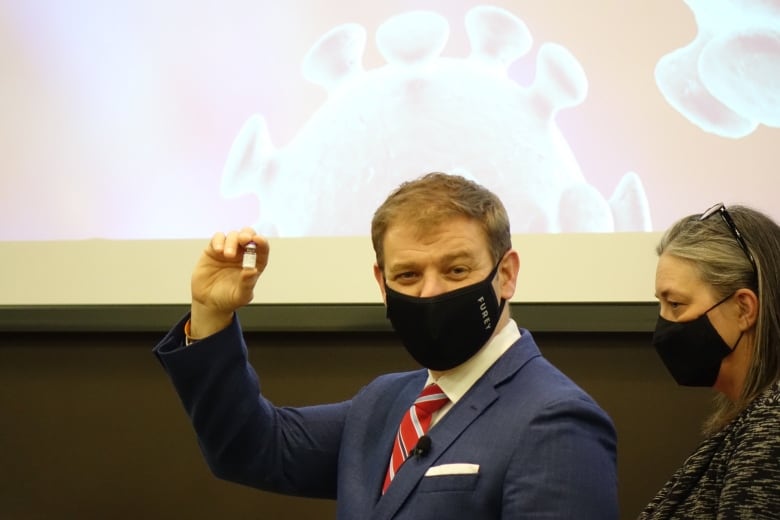5 new cases of COVID-19 in N.L., hours after 1st vaccinations
Front-line health-care workers get 1st vaccines as premier, health minister look on

Newfoundland and Labrador is reporting five new cases of COVID-19 on Wednesday, just two hours after the first people in Newfoundland and Labrador received a vaccination for the disease.
It's only the second time since April that the province has announced five new cases in a single day, the highest daily total since the first wave receded.
Chief Medical Officer of Health Dr. Janice Fitzgerald wasn't fazed by the number.
"It's not unusual to see a small jump in cases," she told reporters at Wednesday's media briefing. "Our numbers are small, so if you have more than one it seems like a lot. None of these cases are concerning in the sense of onward transmission."
All five cases are travel-related, with four in the Eastern Health region and one in the Central Health region, according to Fitzgerald.
The case in the Central Health region is a man between the ages of 20 and 39 who returned from work in Alberta.
In the Eastern Health region, the cases are:
- A male under 19, who isn't a resident of the province, who came here from Asia.
- A male and female between the ages of 20 and 39, who aren't residents of the province, who came here from Asia.
- A male between the ages of 50 and 59 who returned to the province from work in Alberta.
It's not clear yet whether Wednesday's youngest case has had any contact with other school-age children, a concern that's spiked in recent days following the province's first reported case in a student in November, and a positive case in a school staff member earlier this month. Fitzgerald said contact tracing in the case announced Wednesday is still underway.
With two new recoveries, said Fitzgerald, the province now has 23 active cases.
Vaccination plan revealed
Earlier Wednesday, the province unveiled the details of its vaccine rollout plan. Health-care workers in the highest-risk settings, especially those assigned to COVID-19 patients, get priority, Fitzgerald said.
Fitzgerald administered the first inoculations against the coronavirus to front-line workers in St. John's on Wednesday afternoon.
Ellen Foley-Vick, a registered nurse with public health, and Dr. Jatin Morkar, clinical chief with the medicine program, received the Pfizer-BioNTech shot at Memorial University's school of medicine.
Manufacturers aren't yet allowing that vaccine to travel beyond designated distribution points, meaning the first on the list will need to receive the vaccine in St. John's. The Pfizer-BioNTech product also requires low-temperature freezers that can reach –80 C. Newfoundland and Labrador has two of those freezers, both located in the capital.

On the list to receive the first doses are COVID-19 testing and immunization staff and those in emergency rooms, labour and delivery departments, and critical-care units.
Other health-care workers will be prioritized as more doses arrive, Fitzgerald said.
"These are the health-care professionals most likely to come into contact with COVID-19 and transmit to high-risk individuals, or are essential to maintaining COVID-19 response," she said.
More freezers will arrive soon, she added. They'll be placed in planned immunization sites in Labrador West, Gander, Corner Brook, and Happy Valley-Goose Bay.
Other priority groups
Once the province has doses of vaccines that don't require such strict handling, Fitzgerald said, staff and residents in long-term-care homes and living in communal settings will be the top priority, as well as residents of remote and Indigenous communities and the elderly.
The goal for the first three months of 2021, she said, is to "vaccinate those most vulnerable to the severe effects" of the virus, or those most at risk of exposure and transmission.

Phase 2 will begin once Pfizer gives the green light to transport the vaccine more widely, or when the Moderna vaccine, which isn't yet approved in Canada, arrives. Fitzgerald said the immunization program will remain focused on those priority groups.
In Phase 3, officials will offer the shot to the general public. Fitzgerald said earlier Wednesday that may happen around June.
"It is anticipated we will have enough supply to vaccinate everyone who wishes to be vaccinated by the fall of 2021," she said.
Fitzgerald said she's in no rush to move the province to Alert Level 1. "It's not just solely determined by whether or not we have a vaccine," she said, noting the levels in the province's phased reopening plan depend on a number of factors, such as disease spread.
Premier Andrew Furey said much of the costs for immunization products will be handled by the federal government, while the province will handle staffing related to its distribution.
Officials weren't yet clear on the exact financial breakdown but, he said, "it's worth every penny."
Manitoba, Nova Scotia and Prince Edward Island also gave their first doses on Wednesday.
Watch the full briefing for Dec. 16: